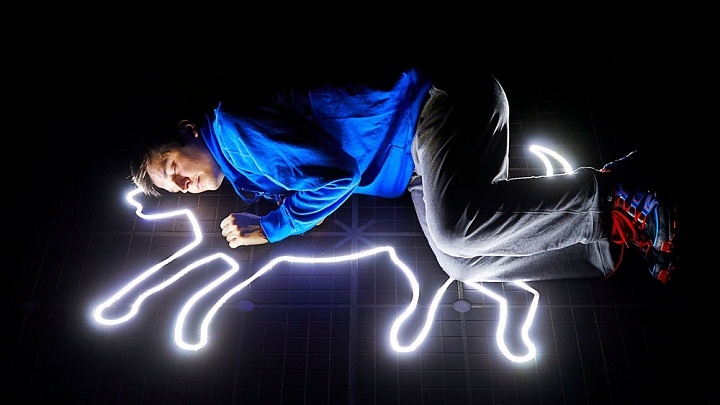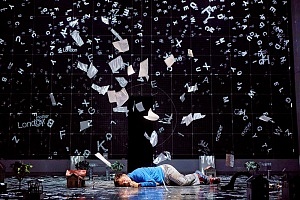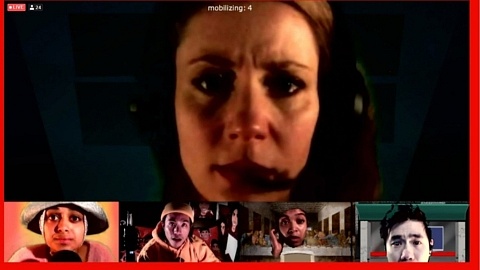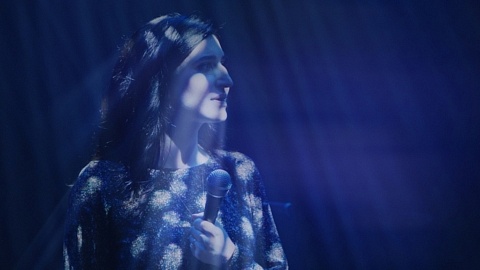Rick Roberts’ Orestes, directed by Richard Rose, confronts the progressively blurring lines between real life and virtual life in a heightened version of the...
The Curious Incident of the Dog in the Night-Time Piques Curiosity, Concern
For their final review of the term, the DARTcritics class take on The National Theatre’s production of The Curious Incident of the Dog in the Night-Time, playing at Mirvish’s Princess of Wales Theatre. The acclaimed production may have won both Olivier and Tony Awards, but our critics have more mixed reviews:
Abigail Bloomfield writes,
Earplugs? Check. Sunglasses? Check. Enough patience to sit through two and a half hours of a neurotypical man pretending to be autistic? Ehh…
As a theatre geek, I absolutely loved The Curious Incident of the Dog in the Nighttime. The use of modern technology and physical movement was amazing, and the story it told was wonderfully complex and had me interested from the moment it began. As an autistic person, however, the show left me feeling confused, frustrated, and full of questions.
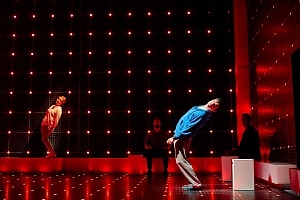
Julie Hale and Joshua Jenkins in The Curious Incident of the Dog in the Night-Time. Photo by Brinkhoff/Moegenburg
Why couldn’t they find an autistic actor to play Christopher, the autistic main character? This was a major question for me, as a recent co-production by the Indiana Repertory Theatre in Indianapolis and Syracuse Stage in New York, which ran for roughly the same time period as the production in Toronto, cast Mickey Rowe as Christopher – the first and so far only autistic actor to play this lead role. Why are there no sensory-friendly performances for those of us who struggle with sensory processing disorder, an all too common companion of autism? I managed to make it through the moments of sensory overload – there were a few, and they were severe – with the use of sunglasses and earplugs, but even that was pushing my boundaries; these coping mechanisms should not be a necessary part of sitting in a theatre to watch a play.
Without the sunglasses and earplugs I am confident that I would have been doubled over in pain in the back of the Princess of Wales Theatre. I understand that the use of flashing lights and ridiculously loud noise is so that the neurotypical audience members can get a small taste of what life is like for those of us on the spectrum on a daily basis. Without any sensory-friendly performances, however, this is far too extreme for those of us on the spectrum that want to see ourselves represented in theatre, a rare enough occurrence without it being made inaccessible by sensory overload.
I have many mixed feelings about the representation in this piece. I am thrilled to finally see autism represented in theatre, but there are many issues with where this representation gets its inspiration, particularly given that Mark Haddon – whose novel this play is adapted from – is neurotypical and has admitted to having done no research before writing, stating on his blog that “imagination always trumps research.” This representation is not coming from within our community, but from outsiders who can only imagine what it really feels like; no matter how good Joshua Jenkin’s portrayal is, seeing a neurotypical actor receive praise for his portrayal of behaviours that many of us on the spectrum receive ridicule for on a daily basis leaves me feeling uncomfortable. Certain moments are downright stereotypical: another tale of a straight, white, boy genius who just happens to be very quirky because he has high functioning autism. Mercifully they didn’t make him out to be a savant and just left it at genius, as that extra cliche would have been unbearable.
All this is not to say the play is bad; many moments are beautifully executed, and the last scene did genuinely bring me to tears as Christopher solves a math problem, showing his love for his specialized interest. To me, this is perhaps the most humanizing and relatable moment, as his joy and excitement can hardly be contained. But unfortunately, between the casting of a neurotypical actor and the lack of sensory-friendly performances, the phrase “Nothing About Us Without Us” does not appear to have been taken into consideration here, making it difficult for me to recommend the production in good conscience. Had those two factors been different, my feelings would likely be far more positive. I can only hope that someday we will be able to have the representation we deserve.
Emma McCormick writes,
The Curious Incident of the Dog in the Night-Time delights its audience, but raises the question of who gets to be included. In a play with the autism spectrum at its centre, the accessibility of the play to autistic spectators is curiously lacking.
Based on Mark Haddon’s novel, the plot follows fifteen-year-old Christopher Boone’s (Joshua Jenkins) investigation into the murder of his neighbour’s dog, Wellington. With his “detective” work as an underscore, we focus on Christopher’s life and relationships, and how they differ from the neurotypical neighbours and acquaintances around him. His inner world is cleverly mapped onto Bunny Christie’s graph paper-esque design, with dazzling interludes of lighting (Paule Constable), video (Finn Ross), and sound (Ian Dickinson for Autograph).
While these technical elements are key, I wondered what my reaction would be if I experienced the world like Christopher. At times, I was overwhelmed by the thrumming music, blinded by the flashing lights, and received a flurry of stimulus from the videos, especially when coupled with the frantic movements of the actors. As someone who does not identify on the autism spectrum, if I experienced slight discomfort, I imagine that an autistic person would feel those sensations with greater awareness and potentially negative results. Granted, several of these “sensory overload” moments exist to demonstrate Christopher’s extreme antipathy to crowds, being touched, or unfamiliar situations. Still, it banks on the fact that the audience will be able to bounce back from those instances quickly, while Christopher requires time to process the flurry of visual/audible information onstage. This is the biggest problem, because it positions the audience as inherently different than Christopher, which leaves little room for spectators who experience the world as Christopher does.
For me, this is a fundamental shortcoming, because it seemingly counteracts its intention. Christopher continually demonstrates his ingenuity, his intelligence, and his capability to succeed in any task he wishes to pursue. It is heartwarming and inspiring, but, when performed to and by those who will never face his struggles, the value of this journey lacks dignity.
Furthermore, the attitudes of the community around Christopher do not alter by the end of the play, nor do the major players in his life seem to recognize the actual root of their negative behaviour. His father, for instance, implores Christopher to trust him after admitting to highly untrustworthy behaviour, and promises to not hurt his son, though his instinctive angry response repeatedly results in physical engagement. Neither problem finds neat resolution, and while this can highlight problems in contemporary treatment of autistic people, the lack of positive development feels like a “get out of thinking free” card for the neurotypical audience.
Do not mistake me: the play is thoroughly entertaining, and takes valuable risks. However, it possesses a curious ignorance about its own cultural significance, and, thus, is merely another incident that proves flash does not equal artistic substance.
Mae Smith writes,
The Curious Incident of the Dog in the Night-Time is a spectacle that hits every cue but misses the point.
As we enter the theatre, the stage is already lit up, a large graph pattern lining the floor and the walls. Centre stage is Wellington, the titular dog, splayed out with a pitchfork through his abdomen. It’s a striking image, indicative of the spectacle to come. The show begins suddenly with light strobing and bass pounding through the theatre, shocking the audience to attention as Christopher Boone, a 15 year-old boy with Asperger’s Syndrome (played by Joshua Jenkins), discovers the dog. This begins his journey as a detective, solving the mystery of the dog’s murder as he stumbles upon secrets the neighbourhood has been hiding from him.
The visuals of the show remain consistently stunning: Paule Constable’s lighting design and Finn Ross’s video design coupled with Frantic Assembly’s movement choreography brilliantly map Christopher’s world for us to viscerally experience. It is easy to get wrapped up in this kind of storytelling; but something remains fundamentally off in its content.
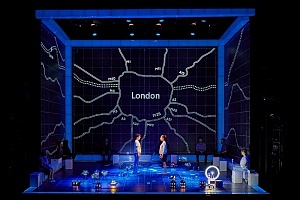
Joshua Jenkins and Emma Beattie in The Curious Incident of the Dog in the Night-Time. Photo by Brinkhoff/Moegenburg.
The author of the novel from which this play is adapted, Mark Haddon, has made attempts to distance Christopher from the label of Asperger’s Syndrome, saying in an article on Penguin Books’ website that he has “always regretted that the phrase ‘Asperger Syndrome’ appeared on the cover” when the book was first published. The show, as well, makes no attempt to present as a champion of representation for those with Asperger’s Syndrome, or people situated anywhere on the Autism spectrum, but the association and identification remains. Even with this attempt at dissociation in mind, I still can’t help but find the way the narrative is shaped around Christopher to be disheartening.
Some common traits individuals with Asperger’s Syndrome may share, according to the Asperger’s Society of Ontario, are difficulty reading social cues, “literal interpretation of communication from others,” and “inappropriate behaviour given the social situation.” Christopher displays these characteristics over the course of the play, as well as an extreme aversion to physical contact and an excelled skill at his favourite activity: math. While at first this portrayal may seem quite positive, as Christopher achieves his goals (from passing A-level maths to taking public transit to London on his own) but it stills feels as though we are being conditioned not to take him seriously.
A constant voice through the play is that of the special-education teacher, Siobhan, who encourages Christopher in everything he does. Yet, as she is coaching him through his math exam, he gets excited when he begins to figure out the answer and she stifles him (in his own story!) She tells him to save his explanation for the curtain call because it wouldn’t be interesting to us. Christopher responds, a little saddened, “But it’s interesting to me.” This is the first — but not the last —moment that I feel my heart break and, and I am led to change my perspective on the whole show. In the play’s final scene, Christopher lays out his plans to ace his classes and become a scientist. He asks Siobhan if, after all he’s done, that means he can do anything and she does not answer. She has been a guide, narrating with his words for at least a third of the play, and she can’t bring herself to say she believes he can succeed. These moments, coupled with the audience’s laughter in reaction to Christopher’s speech patterns, lead me to believe the play perpetuates the culture of other-ing those on the Autism spectrum. In these moments, it is clear that the play is not really on Christopher’s side.
Visually, the show is stunning but an ever brighter light should be shone on the production’s disinterest in its own subject matter – and its own subjects.
Isaac Brown writes,
The National Theatre’s production of The Curious Incident of the Dog in the Night-Time, which recently concluded its tenure at Mirvish’s Princess of Wales Theatre, is a perfectly beautiful blend of substance and spectacle. It rejoices in balancing it’s brilliantly complex design with its touching, authentic performances.
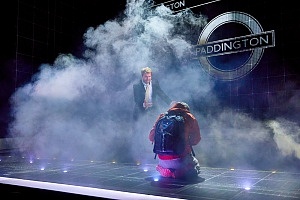
Matt Wilman and Joshua Jenkins in The Curious Incident of the Dog in the Night-Time. Photo by Brinkhoff/Moegenburg.
The very first thing any audience member will notice upon entering the theatre is designer Bunny Christie’s absolutely absurd set: the inside of a gigantic black cube covered entirely in white grid lines, with axes labeled “TIME” and “SPACE”, in the centre of which lies a dead dog, impaled by a garden fork and surrounded by a glowing chalk outline. It’s an image so bizarre that the audience can’t help but ask questions about what they are about to see. Even from my seat near the back of the highest balcony, the set is striking and captivating in its scale. This feeling only intensifies as the show begins with a swell of strobe lights and loud music. From this moment all the way until its post-show epilogue, Curious Incident delights itself in finding new ways to use its massive audio-visual playground of a set. Precisely timed with the actors’ movements, the set transforms itself, lighting up paths on the grid for actors to follow, displaying text to convey a change of location, or illustrating chalk drawings made on the floor across all three walls of the set in real time. All this is made possible by lighting designer Paule Constable and video designer Finn Ross’ use of the massive array of video screens and LED lights that make up the black box stage. There are countless other surprises in the way set and props, each more impressively creative than the last. Describing them all would take ages, and trust me, they’re worth seeing for yourself.
While its flair for the dramatic certainly makes The Curious Incident of the Dog in the Night-Time memorable, the heart and soul of the show is its incredible ensemble cast. The group truly has no weak link, but is strongest in its lead actor Joshua Jenkins, playing 15-year-old Christopher Boone. The play follows Christopher on a whimsically uplifting and tragically heartbreaking coming of age story that reflects on family and self-discovery. It is worth mentioning how well Curious Incident handles some of its more sensitive subject matter. Christopher lives with a developmental disorder, likely Asperger’s, though it is never actually specified. The play doesn’t delve into preachiness, or attempt to use Christopher’s disorder to paint him as a victim. Instead, it focuses on what makes him an individual. This level of maturity is what allows Jenkins to thrive in creating a complex and thoroughly lovable lead character. Despite the fact that Christopher is on stage for the entirety of the show’s two-hour runtime, the audience never grows tired of seeing him learn and understand the world around him.
The Curious Incident of the Dog in the Night-Time is truly spectacular. It masterfully intertwines impressive spectacle with a brutal, emotional drive and a thoroughly beautiful story. It celebrates its theatricality while simultaneously pulling its audience into a very real world. This one is more than worth your time.
Related Posts
Every year the University of Windsor School of Dramatic Art produces multiple plays featuring its fourth-year students. This year, under the circumstances of...
Pre-recorded digital theatre can reduce performers to ghosts. The moment of ephemerality has passed; a recording hopes to capture its spirit for the viewer. I...
Every year the University of Windsor School of Dramatic Art produces multiple plays featuring its fourth-year students. This year, under the circumstances of...
Pre-recorded digital theatre can reduce performers to ghosts. The moment of ephemerality has passed; a recording hopes to capture its spirit for the viewer. I...
Leave a Reply (Cancel Reply)
Twitter Feed
Blogroll
DARTcritics.com is partially funded by the Marilyn I. Walker School of Fine and Performing Arts, in support of student learning; experiential education; student professionalization; public engagement with the teaching, learning and production activities of the Department of Dramatic Arts; new ways of thinking; and the nurturing of links with our communities.

